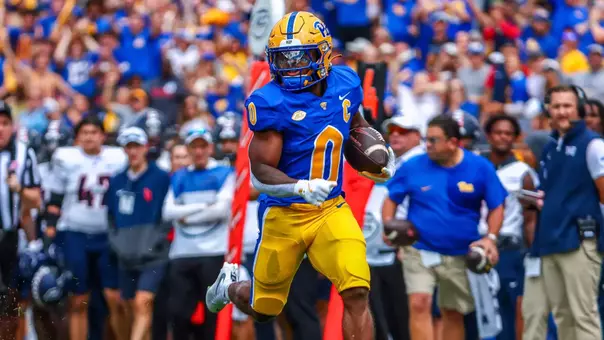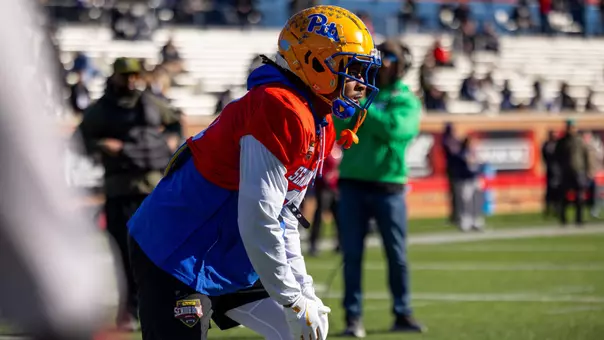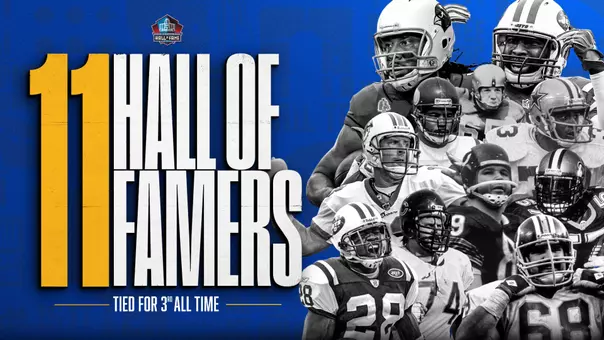University of Pittsburgh Athletics
Photo by: George Gojkovich
College Football Hall of Fame Candidate: Craig “Ironhead” Heyward
6/3/2019 11:00:00 AM | Football
More than three decades after his final college game—and 13 years since his untimely passing from a brain tumor—Craig Heyward remains one of the most popular and revered figures in the long history of Pitt football.
What is it about the man eternally known as "Ironhead" that makes him as big a folk hero today as when he motored around the turf at Pitt Stadium during the Reagan Administration?
In short, everything.

Named to the College Football Hall of Fame ballot for the 2020 induction class, Heyward was an "everyman" star. He was a tailback in a nose tackle's body. A sports car with the frame of a bulldozer. He was as prolific with colorful quips as he was with rushing yards.
Those who saw him play will forever remember his incredible combination of agility and power. In a single play, Heyward could blaze through an open hole with speed and precision and then mow down defenders in the secondary like a runaway 18-wheeler.
Former Pitt head coach Mike Gottfried relayed this anecdote during Heyward's collegiate days.
"After practice was over Craig challenged one of our wide receivers in the 40," Gottfried said. "They got down and took off. Craig got so far ahead he turned around and ran the last five yards backwards."
That speedy and punishing running style made him a first team All-American and Heisman Trophy finalist in 1987. It also led to a subsequent decade-plus career in the National Football League.
Although he played only three active college seasons, Heyward finished his career as Pitt's third all-time leading rusher with 3,086 yards. His dazzling 1987 season saw him emerge as a national star as he rushed for 1,791 yards to earn consensus All-America honors and finish fifth in the Heisman Trophy balloting.
Heyward rushed for 100 yards in all 12 games during that campaign. He and Tony Dorsett are the only Pitt backs to rush for at least 100 yards 12 times in a single season.
Heyward's performance in the '87 season opener—played against BYU on a muggy Thursday night in Provo, Utah—gave an early indication of what kind of year he would have. He rushed for 133 yards, had two receptions for 66 more and even threw a 17-yard touchdown pass to lead the Panthers to a 27-17 victory.
The game's most memorable image occurred when Heyward hauled in a screen pass and sprinted 40 yards down the right sideline, hurdling a defensive back in the process.
"I got that from Air Jordan," he later quipped in reference to NBA star Michael Jordan. "I'm Air Iron."
Heyward proved he could go to the air if necessary, but he inflicted his fiercest damage on the ground. Even though defenses knew he was Pitt's offensive focal point, the 6-foot, 260-pounder couldn't be stopped.
In the final regular-season game of 1987, against Kent State at Pitt Stadium, Heyward rushed for 259 yards and three touchdowns. He carried on each of Pitt's first 13 plays, accounting for two entire touchdown drives.
Following the '87 campaign, Heyward elected to forego his final season of eligibility and turn professional. In the 1988 NFL Draft he was selected in the first round by the New Orleans Saints with the 24th overall pick.
Heyward went on to play 11 seasons in the NFL, including five with New Orleans (1988-92) and also had stints with Chicago (1993), Atlanta (1994-96), St. Louis (1997) and Indianapolis (1998).
His best season as a professional was in 1995 when he was selected for the Pro Bowl after rushing for 1,083 yards.
One final Ironhead memory: The year following his initial tumor diagnosis, Heyward made his way back to Pittsburgh for the final game at Pitt Stadium on November 13, 1999.
He visited the Panthers' locker room before kickoff and was moving from player to player, banging their shoulder pads, yelling "Come on! Let's go!"
Some three-plus hours later, as Pitt was putting the final touches on a 37-27 victory over Notre Dame, there was Ironhead again, this time revving up the student section with high fives.
For all of his physical prowess, perhaps Ironhead's greatest attribute was an indomitable spirit that was immeasurable in yards, pounds or touchdowns.
About The National Football Foundation (NFF) & College Hall of Fame 2020 Ballot:
The 2020 ballot includes 76 players and five coaches from the NCAA Football Bowl Subdivision and 101 players and 33 coaches from the NCAA divisional and NAIA ranks. To be eligible for the ballot, players must have been named a First Team All-American by a major/national selector as recognized and utilized by the NCAA for their consensus All-America teams; played their last year of intercollegiate football at least 10 full seasons prior; played within the last 50 years; and cannot be currently playing professional football. Coaches must have coached a minimum of 10 years and 100 games as a head football coach; won at least 60 percent of their games; and be retired from coaching for at least three full seasons. If a coach is retired and over the age of 70, there is no waiting period. If he is over the age of 75, he is eligible as an active coach. In all cases, the candidate's post-football record as a citizen may also be weighed.
The ballot will be emailed the week of June 2 to the more than 12,000 NFF members and current Hall of Famers whose votes will be tabulated and submitted to the NFF's Honors Courts, which deliberate and select the class. The FBS Honors Court, chaired by NFF Board Member and College Football Hall of Famer Archie Griffin from Ohio State, and the Divisional Honors Court, chaired by former Marshall head coach, longtime athletics director and NFF Board Member Jack Lengyel, include an elite and geographically diverse pool of athletic administrators, Hall of Famers and members of the media.
As part of a continuing tradition, the NFF has partnered with the College Football Playoff (CFP) to announce the new College Football Hall of Fame class during festivities prior to the National Championship in the host city. The announcement of the 2020 Class will be made in January 2020 in New Orleans, and they will be inducted during the 63rd NFF Annual Awards Dinner on Dec. 8, 2020, at the New York Hilton Midtown. The inductees will be permanently enshrined at the Chick-fil-A College Football Hall of Fame in Atlanta.
Of the 5.33 million individuals who have played college football since Princeton first battled Rutgers on Nov. 6, 1869, only 1,010 players have earned induction into the College Football Hall of Fame, or less than two one-hundredths of a percent (.02%) of those who have played the game during the past 150 years. From the coaching ranks, 219 individuals have achieved Hall of Fame distinction.
#H2P | Facebook | Twitter | Instagram
What is it about the man eternally known as "Ironhead" that makes him as big a folk hero today as when he motored around the turf at Pitt Stadium during the Reagan Administration?
In short, everything.

Named to the College Football Hall of Fame ballot for the 2020 induction class, Heyward was an "everyman" star. He was a tailback in a nose tackle's body. A sports car with the frame of a bulldozer. He was as prolific with colorful quips as he was with rushing yards.
Those who saw him play will forever remember his incredible combination of agility and power. In a single play, Heyward could blaze through an open hole with speed and precision and then mow down defenders in the secondary like a runaway 18-wheeler.
Former Pitt head coach Mike Gottfried relayed this anecdote during Heyward's collegiate days.
"After practice was over Craig challenged one of our wide receivers in the 40," Gottfried said. "They got down and took off. Craig got so far ahead he turned around and ran the last five yards backwards."
That speedy and punishing running style made him a first team All-American and Heisman Trophy finalist in 1987. It also led to a subsequent decade-plus career in the National Football League.
Although he played only three active college seasons, Heyward finished his career as Pitt's third all-time leading rusher with 3,086 yards. His dazzling 1987 season saw him emerge as a national star as he rushed for 1,791 yards to earn consensus All-America honors and finish fifth in the Heisman Trophy balloting.
Heyward rushed for 100 yards in all 12 games during that campaign. He and Tony Dorsett are the only Pitt backs to rush for at least 100 yards 12 times in a single season.
Heyward's performance in the '87 season opener—played against BYU on a muggy Thursday night in Provo, Utah—gave an early indication of what kind of year he would have. He rushed for 133 yards, had two receptions for 66 more and even threw a 17-yard touchdown pass to lead the Panthers to a 27-17 victory.
The game's most memorable image occurred when Heyward hauled in a screen pass and sprinted 40 yards down the right sideline, hurdling a defensive back in the process.
"I got that from Air Jordan," he later quipped in reference to NBA star Michael Jordan. "I'm Air Iron."
Heyward proved he could go to the air if necessary, but he inflicted his fiercest damage on the ground. Even though defenses knew he was Pitt's offensive focal point, the 6-foot, 260-pounder couldn't be stopped.
In the final regular-season game of 1987, against Kent State at Pitt Stadium, Heyward rushed for 259 yards and three touchdowns. He carried on each of Pitt's first 13 plays, accounting for two entire touchdown drives.
Following the '87 campaign, Heyward elected to forego his final season of eligibility and turn professional. In the 1988 NFL Draft he was selected in the first round by the New Orleans Saints with the 24th overall pick.
Heyward went on to play 11 seasons in the NFL, including five with New Orleans (1988-92) and also had stints with Chicago (1993), Atlanta (1994-96), St. Louis (1997) and Indianapolis (1998).
His best season as a professional was in 1995 when he was selected for the Pro Bowl after rushing for 1,083 yards.
One final Ironhead memory: The year following his initial tumor diagnosis, Heyward made his way back to Pittsburgh for the final game at Pitt Stadium on November 13, 1999.
He visited the Panthers' locker room before kickoff and was moving from player to player, banging their shoulder pads, yelling "Come on! Let's go!"
Some three-plus hours later, as Pitt was putting the final touches on a 37-27 victory over Notre Dame, there was Ironhead again, this time revving up the student section with high fives.
For all of his physical prowess, perhaps Ironhead's greatest attribute was an indomitable spirit that was immeasurable in yards, pounds or touchdowns.
About The National Football Foundation (NFF) & College Hall of Fame 2020 Ballot:
The 2020 ballot includes 76 players and five coaches from the NCAA Football Bowl Subdivision and 101 players and 33 coaches from the NCAA divisional and NAIA ranks. To be eligible for the ballot, players must have been named a First Team All-American by a major/national selector as recognized and utilized by the NCAA for their consensus All-America teams; played their last year of intercollegiate football at least 10 full seasons prior; played within the last 50 years; and cannot be currently playing professional football. Coaches must have coached a minimum of 10 years and 100 games as a head football coach; won at least 60 percent of their games; and be retired from coaching for at least three full seasons. If a coach is retired and over the age of 70, there is no waiting period. If he is over the age of 75, he is eligible as an active coach. In all cases, the candidate's post-football record as a citizen may also be weighed.
The ballot will be emailed the week of June 2 to the more than 12,000 NFF members and current Hall of Famers whose votes will be tabulated and submitted to the NFF's Honors Courts, which deliberate and select the class. The FBS Honors Court, chaired by NFF Board Member and College Football Hall of Famer Archie Griffin from Ohio State, and the Divisional Honors Court, chaired by former Marshall head coach, longtime athletics director and NFF Board Member Jack Lengyel, include an elite and geographically diverse pool of athletic administrators, Hall of Famers and members of the media.
As part of a continuing tradition, the NFF has partnered with the College Football Playoff (CFP) to announce the new College Football Hall of Fame class during festivities prior to the National Championship in the host city. The announcement of the 2020 Class will be made in January 2020 in New Orleans, and they will be inducted during the 63rd NFF Annual Awards Dinner on Dec. 8, 2020, at the New York Hilton Midtown. The inductees will be permanently enshrined at the Chick-fil-A College Football Hall of Fame in Atlanta.
Of the 5.33 million individuals who have played college football since Princeton first battled Rutgers on Nov. 6, 1869, only 1,010 players have earned induction into the College Football Hall of Fame, or less than two one-hundredths of a percent (.02%) of those who have played the game during the past 150 years. From the coaching ranks, 219 individuals have achieved Hall of Fame distinction.
#H2P | Facebook | Twitter | Instagram
Newcomer Media Availability | QBs and RBs
Wednesday, February 11
Pitt Football Celebrates Black History Month
Tuesday, February 10
Pitt Football | Canton is BLUE and GOLD!
Saturday, February 07
Pitt Football | Congrats, Larry!
Friday, February 06



